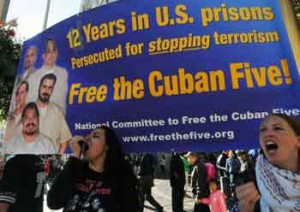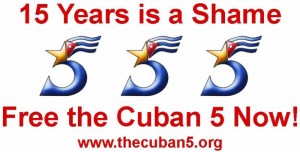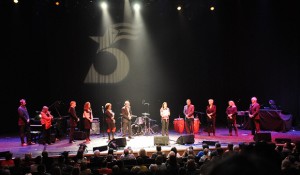www.thecuban5.org
May 15, 2014
By Salim Lamrani
Since 2009, U. S. agent Alan Gross has been serving a fifteen year prison sentence in Cuba for providing material support to the Cuban opposition. In the meanwhile, three Cuban agents have been incarcerated in the United States since 1998. The possibility of an exchange of prisoners exists. The case of Gerardo Hernández, one of the three Cubans sentenced to two terms of life imprisonment, lends itself particularly well to such a humanitarian agreement. Here, in 25 points, are the reasons why.
1. Following the collapse of the Soviet Union in the 1990s, the radical sector of the Florida-based Cuban exile community increased its terrorist attacks against Cuba. The tourism industry – a vital sector of the fragile Cuban economy – was a particular target. Bomb attacks resulted in dozens of casualties. Faced with the immunity these violent fringe groups were receiving from U.S. authorities, the Havana government decided to send several agents to the United States to infiltrate these criminal organizations and prevent the realization of further potentially lethal acts.
2. In June 1998, after gathering evidence about the terrorist activities of 64 exiles living in Florida, the Cuban government invited two FBI officers to Havana in order to present them with the evidence that it had accumulated. But, rather than arresting those responsible for these crimes, the FBI arrested the five Cuban intelligence services agents who had infiltrated the criminal organizations: René González Sehweret, Ramón Labañino Salazar, Fernando González Llort, Antonio Guerrero Rodriguez and Gerardo Hernández Nordelo.
3. Following a trial that has been denounced by many legal institutions for its numerous irregularities, the five Cubans nonetheless won their case on appeal from a three-judge panel of the Atlanta Court of Appeals. The tribunal found that they had not received a fair trial. The U.S. government, however, lodged an appeal and the Five eventually received a total of four sentences of life imprisonment, and an additional sentence of 77 years. On October 13, 2009, the Atlanta Court of Appeals instructed the Florida court to modify the prison sentences for three of the five defendants. The review that was conducted resulted in Antonio Guerrero’s penalty of life imprisonment plus 10 years being changed to 21 years plus 10 months, plus an additional penalty of five years of supervised release. On December 8, 2009, Fernando González’ sentence of 19 years was reduced to 17 years plus nine months. In the case of Ramón Labañino, his sentence of imprisonment for life plus 18 years was reduced to 30 years in prison. Rene González and Fernando González were freed after serving their entire sentences.
4. Gerardo Hernández was sentenced to two terms of life imprisonment plus 15 years in prison for conspiracy to commit a quadruple murder. He is accused of being directly involved in an incident that occurred on February 24, 1996. That day two planes, manned by four pilots from the Florida-based organization Brothers to the Rescue (BTTR), were shot down by Cuban armed forces after having violated Cuban airspace 25 times in 20 months.
5. José Basulto, president of BTTR, a former CIA officer who had participated in the Bay of Pigs invasion, is heavily implicated in terrorist acts against Cuba. In a Miami television interview Basulto publicly admitted to having participated in several strikes against Cuba, including a bazooka attack on a hotel in August of 1962.
6. BTTR was founded in 1991 to assist the Cubans trying to reach Florida by sea. In 1994, Washington and Havana signed immigration agreements that authorized the granting of 20,000 visas per year to Cubans wishing to emigrate. These agreements also provide that any person attempting to reach the United States by sea would be returned to Cuba. With this agreement, BTTR lost its reason for being and has since begun organizing raids inside Cuban airspace.
7. A chronology of events permits us to capture the key elements of this story. During the months preceding the serious incident of February 24, 1996, Cuban authorities warned the United States frequently, both through diplomatic notes and unofficial channels, that repeated violations of its airspace constituted a threat to Cuban national security and that the planes involved were running the risk of being shot down. Washington chose to ignore these warnings.
8. Ignoring the risk of being shot down, BTTR aircraft on several occasions provoked the Cuban armed forces by entering Cuban national airspace. In addition to its forays over the capital, BTTR planes created interference between the Havana control tower and aircraft landing at José Martà International Airport, thereby endangering the lives of thousands of Cuban passengers and foreign tourists.
9. On July 13, 1995, BTTR planes flew over the city of Havana and dropped 20,000 leaflets, inciting the population to rise up against the government.
10. On the same day, Cuban authorities sent a letter emphasizing the possibility of a military response to the Federal Aviation Administration. The letter underscored the illegal incursions into Cuban national airspace and the “serious consequences” that such acts could entail if they were to continue .
11. The Government of the United States, instead of taking the necessary measures to prevent such violations of international law, allowed BTTR the latitude necessary to pursue their incursions, despite the fact that the organization, since 1994, had repeatedly filled false flight plans with the Federal Aviation Administration.
12. At no time had Gerardo Hernández participated in the Cuban airspace violations, nor had he incited BTTR members to commit these illegal and dangerous acts. Moreover, Hernandez had never participated at the necessary hierarchical level within BTTR to prevent these flights. Everything was under the control of José Basulto.
13. The State Department issued several statements warning BTTR that its planes ran the risk of being shot down if they continued to violate Cuban airspace.
14. In January 1996, BTTR dropped 500,000 leaflets over Havana inciting the population to overthrow the government. On January 15, 1996, Cuba once again demanded that the U.S. put an end to the repeated violations of its airspace.
15. After new breaches of their national airspace in January 1996, Cuba warned Washington that if these overflights continued, the aircraft would be shot down. Havana reiterated these warnings to all U.S. public figures who visited the island between January 15 and February 23, 1996.
16. On January 22, 1996, the State Department sent an alert to the Federal Aviation Administration: “One of these days, the Cubans are going to shoot down one of those planes .” José Basulto had repeatedly stated in the media that he was aware of the danger.
17. In February 1996, Cuban authorities sent a message to their agents in Miami indicating that in no case should they participate in BTTR flights.
18. On February 23, 1996, the Federal Aviation Agency sent an “Alert Cuba” message to several agencies indicating that BTTR planned a new foray into Cuban airspace the following day. “The State Department said it would be unlikely that the Cuban government would exercise restraint this time .”
19. On 24 February 1996, the government of the United States warned the Cuban authorities that three BTTR planes had taken off from Miami and were able to penetrate Cuban airspace.
20. After several warnings, two of the three planes were shot down by Cuban forces in Cuban airspace, an action that constitutes an act of self-defence under international law. No country in the world – certainly not the United States – would have waited until the 26th violation of its airspace by an organization, after having made numerous appeals for help, to take such a measure.
21. However, the United States asserts that, according to its satellite data, the two planes were shot down in the international zone, which would constitute the crime for which Gerardo Hernández is accused. Of course, publication of satellite data would remove any ambiguity about the matter. However, since 1996, the United States has refused, for reasons of “national security,” to make this information public despite repeated requests from Gerardo Hernández’ lawyers.
22. In any case, Hernández has not been implicated in the decision to shoot down the planes, a decision that was taken by the Cuban authorities at the highest level.
23. In order to convict Gerardo Hernández, the prosecution needed to prove that there had been an illegal scheme afoot to shoot down BTTR aircraft in international airspace and that Hernández had precise knowledge of this scheme and in fact had supported such an action. The prosecution was unable to provide any evidence demonstrating the involvement of Gerardo Hernández in this drama. Better yet, the prosecutor acknowledged that “the evidence presented at trial that attempts [to prove the involvement of Gerardo Hernández] represents an insurmountable obstacle for the United States .”
24. Judge Phyllis A. Kravitch of the Atlanta Court of Appeals has spoken about the case of Gerardo Hernández: “A shoot down in Cuban airspace would not have been unlawful […]. It is not enough for the Government to show that a shoot down merely occurred in international airspace: the Government must prove beyond a reasonable doubt that Hernández agreed to a shoot down in international airspace. Although such an agreement may be proven by circumstantial evidence, here, the Government failed to provide either direct or circumstantial evidence that Hernández agreed to a shoot down in international airspace. Instead, the evidence points out toward a confrontation in Cuban airspace, thus negating the requirement that he agreed to commit an unlawful act.”
25. For all of these reasons, Barack Obama should use his powers as President of the United States and pardon the three Cubans that are still imprisoned. This will have the immediate effect of freeing Alan Gross and improving relations between Washington and Havana.
Translated from the French by Larry R. Oberg
Docteur ès Etudes Ibériques et Latino-américaines at the University of Paris Sorbonne-Paris IV, Salim Lamrani is a Lecturer the University of La Réunion, and a journalist who specializes in relations between Cuba and the United States.
The author’s latest book is The Economic War against Cuba. A Historical and Legal Perspective on the U.S. Blockade, New York, Monthly Review Press, 2013. http://monthlyreview.org/press/books/pb3409/ Â (prologue by Wayne S. Smith and preface by Paul Estrade).
http://www.globalresearch.ca/cuban-five-a-prisoner-exchange-that-could-improve-relations-between-cuba-and-the-united-states/5382416
Contact : lamranisalim@yahoo.fr  ; Salim.Lamrani@univ-reunion.fr
Facebook : https://www.facebook.com/SalimLamraniOfficiel














